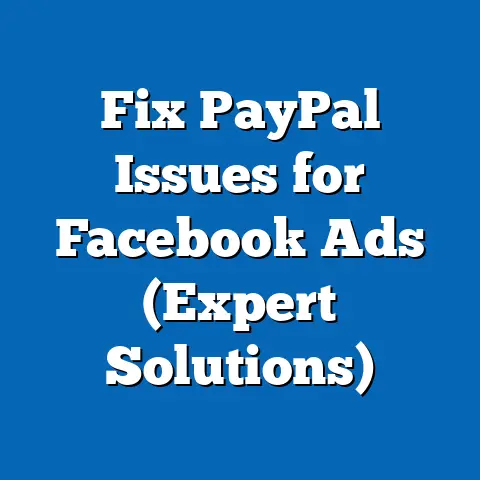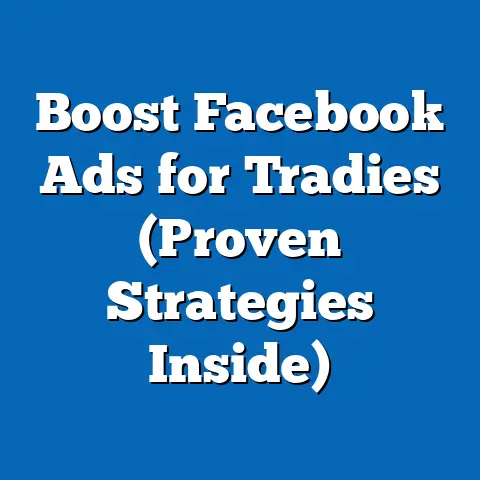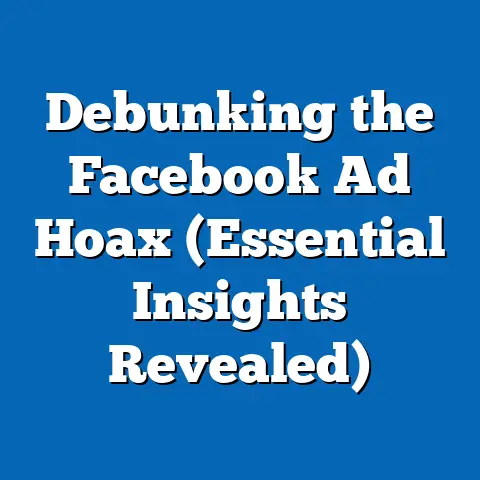Boost Sales: Buy Facebook Ads Accounts (Profit Strategy)
In the fast-paced world of digital marketing, businesses are constantly seeking innovative ways to amplify their reach and drive sales.
One strategy that has gained significant traction is the use of purchased Facebook Ads accounts to bypass restrictions, scale advertising efforts, and maximize profits.
But what are the defining characteristics of this approach, how did it emerge within the historical context of digital advertising, and what are the broader societal and ethical implications of this practice?
Defining the Practice: What Does It Mean to Buy Facebook Ads Accounts?
Buying Facebook Ads accounts refers to the acquisition of pre-existing or newly created accounts specifically for running advertisements on the platform.
These accounts are often purchased from third-party vendors or individuals and are used to circumvent Facebook’s stringent advertising policies, account limitations, or bans that businesses might face due to policy violations or other restrictions.
The defining characteristic of this strategy is its focus on scalability and access.
Many businesses, especially in competitive or restricted niches such as cryptocurrency, gambling, or certain health products, find their primary accounts flagged or suspended by Facebook’s automated systems or manual reviews.
Purchasing additional accounts allows these businesses to continue advertising without interruption, often under different identities or proxies to avoid detection.
Another key feature is the profit-driven motive.
By leveraging multiple accounts, businesses can test various ad creatives, target diverse audiences, and increase their ad spend without being constrained by a single account’s limits.
However, this practice operates in a gray area, as it often violates Facebook’s terms of service, raising questions about ethics and long-term sustainability.
Historical Context: The Evolution of Digital Advertising and the Rise of Account Purchases
To understand the phenomenon of buying Facebook Ads accounts, we must first trace the evolution of digital advertising and the role of social media platforms like Facebook in shaping modern marketing.
When Facebook launched its advertising platform in 2007, it introduced a revolutionary way for businesses to target users based on detailed demographic and behavioral data.
This marked a shift from traditional advertising to hyper-personalized, data-driven campaigns.
By the early 2010s, Facebook Ads had become a cornerstone of digital marketing, with millions of businesses—ranging from small startups to global corporations—relying on the platform to drive sales and build brand awareness.
However, as the platform grew, so did its regulatory framework.
High-profile incidents, such as the 2016 Cambridge Analytica scandal, led to increased scrutiny of data privacy and advertising practices, prompting Facebook to tighten its policies on ad content, account verification, and user targeting.
These stricter regulations, while aimed at protecting users, created challenges for many legitimate businesses.
For instance, in 2018, Facebook began cracking down on accounts promoting misleading or prohibited content, often using automated systems that flagged accounts with little recourse for appeal.
This led to a surge in demand for alternative solutions, including the purchase of pre-verified or “aged” accounts that appeared less suspicious to Facebook’s algorithms.
The rise of e-commerce and affiliate marketing further fueled this trend.
Entrepreneurs and marketers in niches with high competition or strict regulations turned to buying accounts as a way to maintain their advertising momentum.
By 2020, online forums and marketplaces dedicated to selling Facebook Ads accounts had proliferated, reflecting a growing underground economy within the digital marketing space.
Societal Implications: Ethics, Trust, and the Digital Economy
The practice of buying Facebook Ads accounts carries significant societal implications, touching on issues of trust, fairness, and the integrity of the digital economy.
On one hand, it highlights the ingenuity of businesses adapting to restrictive environments, showcasing the entrepreneurial spirit that drives innovation.
On the other hand, it raises ethical concerns about deception, policy circumvention, and the potential harm to consumers.
From a consumer perspective, ads run through purchased accounts may lack transparency.
If a business uses multiple accounts to promote questionable products or services, consumers may be exposed to misleading information without realizing the source.
This can erode trust in online advertising and, by extension, in the platforms that host these ads.
Moreover, this practice contributes to an uneven playing field.
Small businesses or marketers who adhere to Facebook’s policies may struggle to compete with those who exploit purchased accounts to flood the platform with ads.
This disparity can exacerbate economic inequalities within the digital marketing space, favoring those with the resources or willingness to navigate gray areas.
Finally, the broader digital economy is impacted by the strain this places on platform governance.
Facebook invests heavily in maintaining a secure and trustworthy advertising ecosystem, but practices like account buying undermine these efforts.
As a result, the platform may implement even stricter policies, potentially affecting legitimate advertisers and further perpetuating the cycle of policy evasion.
Technological and Economic Drivers Behind the Trend
The rise of buying Facebook Ads accounts is closely tied to technological advancements and economic incentives in the digital marketing landscape.
From a technological standpoint, the sophistication of Facebook’s algorithms and AI-driven moderation systems has created both opportunities and barriers for advertisers.
While these systems enable precise targeting, they also flag accounts at an unprecedented scale, often without clear explanations or appeal processes.
This technological barrier has given rise to a market for accounts that are either pre-verified or designed to appear legitimate through proxies, VPNs, and other tools.
Vendors selling these accounts often claim to provide “aged” profiles with a history of activity, making them less likely to be flagged as suspicious.
This cat-and-mouse game between advertisers and platform algorithms underscores the dynamic nature of digital advertising technology.
Economically, the potential for high returns drives the demand for purchased accounts.
According to a 2022 report by eMarketer, global digital ad spending reached $567 billion, with social media platforms like Facebook accounting for a significant share.
For businesses in high-margin industries, the cost of buying accounts—often ranging from $50 to $500 per account—pales in comparison to the potential revenue from successful ad campaigns.
Additionally, the gig economy and remote work trends have democratized access to digital marketing skills.
Freelancers and small-scale entrepreneurs, often operating on tight budgets, see purchased accounts as a cost-effective way to scale their operations without investing in complex compliance strategies.
This economic reality reflects the broader shift toward decentralized, agile business models in the digital age.
Mechanisms and Risks: How It Works and What’s at Stake
To fully grasp the strategy of buying Facebook Ads accounts, it’s essential to understand how it operates in practice.
Typically, buyers source accounts through online marketplaces, social media groups, or dedicated vendors.
These accounts may be newly created with fake identities, previously used by other advertisers, or even hacked from unsuspecting users.
Once acquired, the accounts are often linked to new payment methods and managed through tools that mask the user’s location or identity, such as VPNs or virtual machines.
Advertisers then use these accounts to run campaigns, often testing multiple variations of ads to identify the most effective strategies.
In some cases, accounts are rotated frequently to avoid detection, with advertisers maintaining a portfolio of profiles to ensure continuity.
However, this approach is fraught with risks.
The most immediate is the violation of Facebook’s terms of service, which explicitly prohibit the transfer or sale of accounts.
If detected, accounts can be permanently banned, resulting in the loss of ad spend and potential legal repercussions.
A 2021 study by Digital Marketing Institute found that over 60% of marketers who used purchased accounts reported at least one ban within six months, highlighting the high stakes involved.
Beyond platform penalties, there are financial and reputational risks.
Purchased accounts may be tied to fraudulent payment methods or previous policy violations, exposing buyers to chargebacks or legal disputes.
Furthermore, businesses that rely on this strategy may damage their brand credibility if consumers or competitors uncover unethical practices.
Comparing Legitimate and Gray-Area Strategies: A Balanced Perspective
It’s important to compare the strategy of buying Facebook Ads accounts with legitimate advertising practices to understand its appeal and drawbacks.
Legitimate advertisers invest in building compliant accounts, creating high-quality content, and adhering to platform guidelines.
This approach, while time-intensive, fosters long-term trust and sustainability, with brands like Nike and Coca-Cola exemplifying success through transparency and creativity.
In contrast, the gray-area strategy of buying accounts prioritizes speed and scalability over compliance.
While it can yield short-term profits—some marketers report doubling their ad reach within weeks—it lacks the stability of legitimate methods.
The constant threat of bans and policy changes creates a precarious environment, particularly for businesses reliant on consistent revenue streams.
That said, it’s worth acknowledging the diversity of experiences within the digital marketing community.
Not all businesses that buy accounts do so with malicious intent; many are small-scale operators or niche players struggling to navigate Facebook’s complex policies.
This nuance underscores the need for a balanced perspective that recognizes both the innovation and the ethical dilemmas inherent in this practice.
Cultural and Social Factors: The Mindset of Modern Marketers
The cultural and social context of modern marketing also plays a role in the popularity of buying Facebook Ads accounts.
In an era defined by hustle culture and the pursuit of rapid success, many entrepreneurs view digital advertising as a “get-rich-quick” opportunity.
Social media platforms like YouTube and TikTok are filled with tutorials and success stories promoting aggressive scaling tactics, including the use of multiple accounts.
This cultural mindset is reinforced by the pressure to compete in oversaturated markets.
With millions of businesses vying for attention on Facebook, standing out requires constant innovation and risk-taking.
For some, purchasing accounts is less about deception and more about survival in a hyper-competitive landscape.
Socially, the anonymity of online transactions facilitates this practice.
Buyers and sellers operate in a largely unregulated space, with little accountability for unethical behavior.
This lack of oversight reflects broader challenges in governing the digital economy, where innovation often outpaces regulation.
Implications for Businesses, Consumers, and Platforms
The implications of buying Facebook Ads accounts extend across multiple domains, affecting businesses, consumers, and the platforms themselves.
For businesses, the short-term benefits of increased reach and sales must be weighed against the long-term risks of bans, financial losses, and reputational damage.
Companies that adopt this strategy may also find themselves dependent on a cycle of evasion, unable to build a sustainable advertising presence.
Consumers, meanwhile, face the risk of exposure to low-quality or deceptive ads.
Without proper oversight, purchased accounts can be used to promote scams, counterfeit products, or harmful content, undermining trust in online shopping and social media platforms.
A 2020 survey by Pew Research Center found that 54% of consumers felt wary of online ads due to concerns about authenticity, a sentiment that could be exacerbated by practices like account buying.
For platforms like Facebook, the challenge lies in balancing user protection with advertiser access.
Stricter policies and AI-driven moderation can deter unethical behavior, but they also risk alienating legitimate businesses.
The ongoing tension between enforcement and accessibility highlights the need for innovative solutions, such as streamlined appeals processes or tiered verification systems for small businesses.
Expert Perspectives and Data Insights
Experts in digital marketing and ethics offer valuable insights into the phenomenon of buying Facebook Ads accounts.
Dr. Sarah Thompson, a professor of digital economics at Stanford University, argues that this practice reflects broader systemic issues in platform governance.
“Facebook’s policies are designed for a one-size-fits-all approach, but the reality of digital marketing is far more complex.
Until platforms address the root causes of policy evasion, gray-area strategies will persist,” she notes.
Data also sheds light on the scale of this trend.
A 2022 report by Social Media Examiner estimated that up to 15% of active Facebook Ads accounts may be tied to secondary or purchased profiles, though exact figures are difficult to verify due to the clandestine nature of the practice.
Additionally, a survey by HubSpot found that 28% of digital marketers admitted to exploring purchased accounts as a backup strategy after facing account suspensions.
These insights underscore the complexity of the issue, highlighting the interplay between policy, technology, and human behavior.
While data points to the prevalence of account buying, expert opinions emphasize the need for systemic change rather than punitive measures alone.
Forward-Looking Insights: The Future of Digital Advertising and Account Buying
Looking ahead, the future of buying Facebook Ads accounts as a profit strategy remains uncertain, shaped by evolving technologies, policies, and market dynamics.
On one hand, advancements in AI and blockchain could enhance platform security, making it harder for purchased accounts to evade detection.
Facebook’s ongoing investment in machine learning, for instance, aims to identify suspicious activity with greater accuracy, potentially curbing this practice.
On the other hand, the demand for scalable advertising solutions is unlikely to diminish.
As digital ad spending continues to grow—projected to reach $700 billion by 2025, according to eMarketer—marketers will seek new ways to maximize their reach, even in the face of stricter regulations.
This suggests that account buying, or similar gray-area tactics, may evolve rather than disappear, adapting to new technological and policy landscapes.
Another factor to consider is the potential for regulatory intervention.
Governments worldwide are increasingly scrutinizing digital platforms for issues ranging from data privacy to advertising ethics.
If account buying is linked to broader concerns about consumer harm, policymakers may introduce laws targeting both buyers and sellers, reshaping the underground market for accounts.
Ultimately, the trajectory of this practice depends on collaboration between platforms, advertisers, and regulators.
By addressing the root causes—such as overly restrictive policies or lack of support for small businesses—Facebook and other platforms could reduce the incentive for account buying while fostering a more equitable advertising ecosystem.
Conclusion: Navigating the Complexities of a Controversial Strategy
The strategy of buying Facebook Ads accounts to boost sales and maximize profits is a multifaceted phenomenon, reflecting the opportunities and challenges of the digital marketing age.
Rooted in the historical evolution of social media advertising, it highlights the tension between innovation and regulation, offering short-term gains at the cost of long-term risks.
From technological drivers to ethical dilemmas, this practice touches on critical issues of trust, fairness, and sustainability in the digital economy.
As we’ve explored, the implications extend beyond individual businesses to encompass consumers, platforms, and society at large.
While some view account buying as a necessary workaround in a restrictive environment, others see it as a threat to the integrity of online advertising.
The diversity of perspectives and experiences within the marketing community underscores the need for nuanced solutions that address systemic issues without stifling innovation.
Looking forward, the interplay of technology, policy, and market demand will shape the future of this strategy.
Whether it fades into obscurity or adapts to new challenges, one thing is clear: understanding the dynamics of buying Facebook Ads accounts offers valuable insights into the broader evolution of digital marketing.
As platforms and advertisers navigate this complex landscape, the balance between profit and principle will remain a defining question for the industry.





